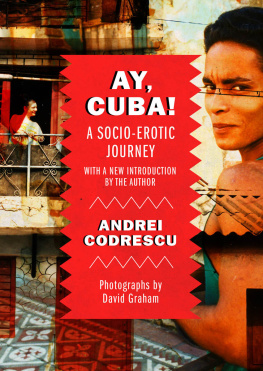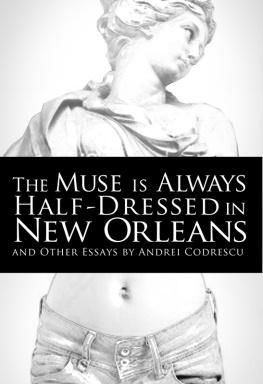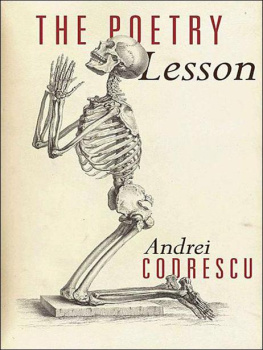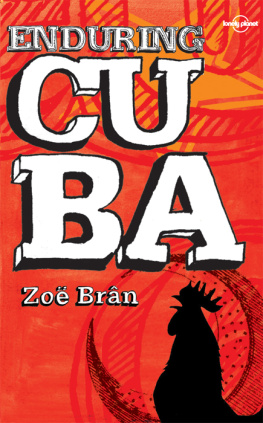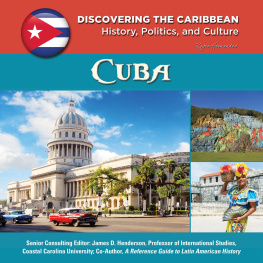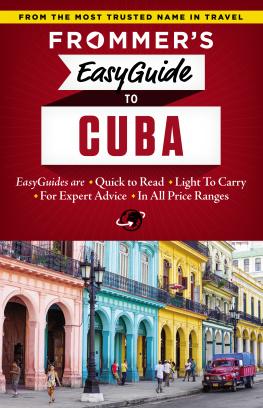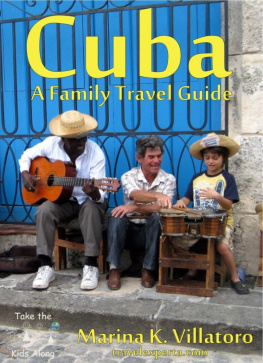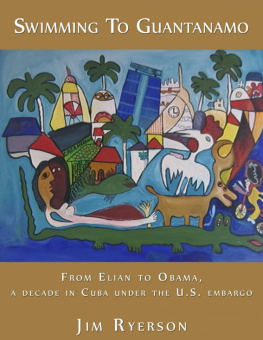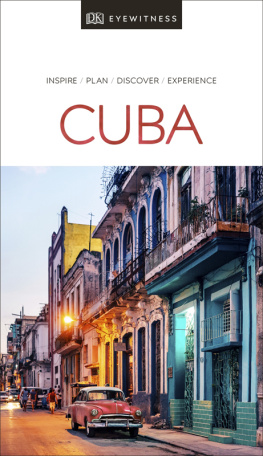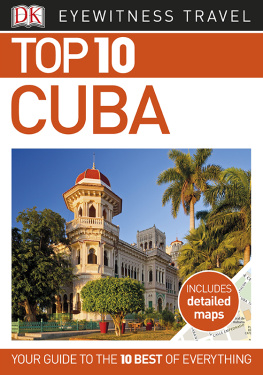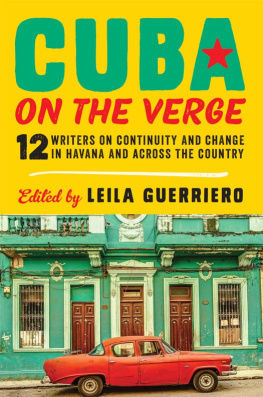Ay, Cuba!
A Socio-Erotic Journey
Andrei Codrescu
Photographs by David Graham

CONTENTS
NOTE TO THE READER
The names used for the individuals identified as Jack, Yasmina, Lenin Gonzalez, Esmeralda Hernndez Dawson, Bill Huxtable, and Dr. Sylvia are not those individuals real names.
LIST OF PHOTOGRAPHS
Introduction
Its the twenty-first century, people! A new pope, a new hope, and a new Cuba? Maybe. But here is a new introduction to my ever-true and getting truer 1999 book, Ay, Cuba!
Ay, Cuba, whispers the doddering old Cold Warrior, whose finest memories hark back to a college break in Havana in 1959, when, during a hot tropical night, he had some of the most exquisite creole cuerpos relieve him of his senses and his wallet. Those were the good old days, and the soon-to-retire senator still has a vivid dream or two every five years, of long and slender bodies flowing in the neon rainbow of the Copacabana nightclub. Hes been angry at losing his beloved whorehouse to Castro in 1959, and even now, hes not really over it. Nor are the old Miami ricos who lost their mansions and monumental marble tombstones when they had to flee with nothing but their diamonds in the probosci. Nor are the old CIA hands who felt that Jack Kennedy sent them to their deaths when he betrayed them at the last minute. At the core of all the deeply held sorrows of these and other Embargo Siempre geriatrics is the regret that they didnt offer Fidel a contract with the Washington Patriots. Hiring him to pitch would have been just like letting Hitler into art school, or publishing Stalins poems before he quit mailing them out. All the time-rusted hatpins who kept our absurd Cuba policies in place for decades know that their past stupidity is equaled only by their current irrelevance.
In 1997, when National Public Radio producer Art Silverman got the bright idea to have NPR smuggle us onto the island just before the visit of Pontiff John Paul the Second, I was giddy. My 1989 reports from Romania for NPR and ABC News got rave comments, and by 1997 our media was already missing communism. In Cuba, you could still get it for the price of a cheap ticket from the Bahamas or Canada, and of a few men-on-the-street and heavy dissenters interviews with the then state-of-the-art minirecorders with minicassettes. The idea was to record the real Cuba just before the pontiff and the world press descended on the island to suck every jinetero or jinetera of his or her already-polished-and-ready stories.
Havana really got its best suit on for the occasion. Christmas was officially approved for the first time since Castros takeover, and scrawny Christmas trees were suddenly trucked from the mountains just before they were turned into pencils. Even tinsel was found somewhere, probably left over in the wardrobes of the wives of officials Castro shot with some regularity every few months. These Christmas trees, stuck with obvious frontal promiscuity in the windows of the better hotels (once casinos) attracted mobs of people who practically licked the windows clean before the policia gave them the heave-ho. Out of nowhere, there came the rusted sounds of a loudspeaker pouring forth Christmas carols in Spanish, a noise so odd that the music Cubans had been listening to for years, Castros voice, rhumba and samba displays for Spanish tourists, and Miami pop and sports for those clever enough to rig coat hangers into antennas on the roofs of their slum dwellings, seemed suddenly of another era. It was like the return of Frank Sinatra to the Copacabana. Whole families of whores in Lycra uniforms appeared on the Malecn, some of them still fresh from sham marriages to Spanish farmers that the Spanish embassy did good business in.
Well, Cuba was a hoot. Naturally, not all the Lycra in the world or the scrawny resurrection of Cristo could hide the obvious: The country was desperately poor, shining with the kind of poverty that an old suit emits when its pulled out of naftaline for a wedding or a funeral. Everyone hustled. Even Cubas highly touted (by the regime) professionals, educated for free, were taking out a night or two to screw a few dollars from a tourist or a reporter.
Of course, we tried to get away from the obvious and get to what mattered: the people. Cubans are a great people. They are warm, they are funny, they are joy-loving, they are talented, they are loud, they are inventive, and above all, they hate the fat Commies who put their country into the hospital for generations. We discovered things Cuba had long ago convinced the West no longer existed: racism, bigotry, crime, corruption, drugs, licentiousness, intricate and colorful superstitions. Its not as if these things were suddenly let out of the closet where they had lain dormant since 1959 when Castro put the thumbscrews to the mobsters. They had existed while the idealist antiVietnam War activists went to Cuba in the 1960s as part of the Venceremos Brigades to harvest sugar cane, for the crop meant to show the superiority of socialist economy (and failed); they were there when the Russians subsidized the economy for the right to stick their atomic dicks at the US (we met quite a few Cubans named Ivan from that glorious periodthey all hated Russians); they were there when the CIA invaded and were annihiliated and Kennedy was assassinated; they were there as two American presidents tried to restore some kind of normal relations with Cuba, and couldnt; they were there when other American presidents and politicians used them as filler for the Commie hogwash pandering to rich Miami gusanos (wormsCastros catchy name for them); and they were there now, waiting for the pope and the world press to tell everyone the truth about Cuba, which was already obvious but not to the Cubans who were kept from news, censored, and ignorant about the outside world.
They couldnt wait to tell their stories, and they told us a lot of them before the rest of the world press came. We ran back and forth like badly disguised detectives, pretending to be film-festival goers, and couldnt wait to see what kind of phony megamuffins were about to be delivered to our colleagues trailing the pope. And then the pope came, and the world press came, and there were no stories about Cuba. The news had broken out of Washington, DC, that a bit of the presidents jizz had been found on Monica Lewinskis blue dress. The entire horde of major mediawar-hardened, high-priced reporters and their crewspacked up and flew back to Washington the very same day. Who knows? A fleck of that precious jizz mightve still been loose somewhere (for a price). And so the Cubans and their truths were left to stew in the tropical sun as Castro and the pope shook hands. (If they washed them afterward, I didnt see it). The greatest historical relic, souvenir, and single tchotchke of that papal visit was a T-shirt bearing the image of El Barbuto shaking hands with the spiritual leader of millions of starving Catholics. (I have two of these shirts, by the way, so if anyones interested, lets talk.)
We had Cuba to ourselves. As you can tell from David Grahams lovely pictures, its impossible to make Cuba not look sexy. Not that David tried: He was like a high school kid let out for the summer to discover the world, and he was serious enough, but his camera, much like Walker Evanss in the 1930s, just couldnt take an ugly picture. The light didnt let them do it. Writing can go on and on about this or that horror, but pictures have their own story to tell. We did discover many things, as you will see in the book, including the Cuban genius for baseball and the weird, mystical flames of Afro-Caribbean Catholic hoodoo. For me, it was like fresh dj-vu, like those wonderful and hideous cookies you loved when you were a kid. I was a brat back in Romania, making fun of

